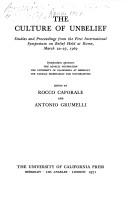| Listing 1 - 3 of 3 |
Sort by
|
Book
ISBN: 0262014084 9786612638176 0262265788 1282638173 9780262265782 9781282638174 9780262014083 9780262513968 026251396X 6612638176 Year: 2010 Publisher: Cambridge, Mass. MIT Press
Abstract | Keywords | Export | Availability | Bookmark
 Loading...
Loading...Choose an application
- Reference Manager
- EndNote
- RefWorks (Direct export to RefWorks)
There are two main questions in epistemology: What is knowledge? And: Do we have any of it? The first question asks after the nature of a concept; the second involves grappling with the skeptic, who believes that no one knows anything. This collection of original essays addresses the themes of knowledge and skepticism, offering both contemporary epistemological analysis and historical perspectives from leading philosophers and rising scholars. Contributors first consider knowledge: the intrinsic nature of knowledge in particular, aspects of what distinguishes knowledge from true belief; the extrinsic examination of knowledge, focusing on contextualist accounts; and types of knowledge, specifically perceptual, introspective, and rational knowledge. The final chapters offer various perspectives on skepticism. Knowledge and Skepticism provides an eclectic yet coherent set of essays by distinguished scholars and important new voices. The cutting-edge nature of its contributions and its interdisciplinary character make it a valuable resource for a wide audience, for philosophers of language as well as for epistemologists, and for psychologists, decision theorists, historians, and students at both the advanced undergraduate and graduate levels.
Electronic books. -- local. --- Knowledge, Theory of -- Congresses. --- Skepticism -- Congresses. --- Knowledge, Theory of --- Skepticism --- Philosophy --- Speculative Philosophy --- Philosophy & Religion --- Scepticism --- Unbelief --- Agnosticism --- Belief and doubt --- Free thought --- PHILOSOPHY/General
Book
ISBN: 9781107069244 1107069246 9781107706590 1108729991 1316322866 1316309487 1316329542 1316326209 1316319504 1316332888 1107706599 1316288773 9781316319505 Year: 2015 Publisher: New York
Abstract | Keywords | Export | Availability | Bookmark
 Loading...
Loading...Choose an application
- Reference Manager
- EndNote
- RefWorks (Direct export to RefWorks)
The two books of Sextus Empiricus' Against the Physicists have not received much attention in their own right, as sustained and methodical specimens of sceptical philosophy. This volume redresses the balance by offering a series of in-depth studies on them, focusing in particular on their overall argumentative structure and on the various ways in which their formal features relate to their contents, showing how Sextus' procedures vary from one section to the other, and throwing new light on the way he was using his sources. It follows Sextus' own division of these two books into nine successive topics, namely god, cause, wholes and parts, body, place, motion, time, number, coming-to-be and passing-away. These nine chapters are preceded by an introduction which discusses a number of general features of Sextus' scepticism and links the conclusions of this volume to some recent discussions on the scope of ancient scepticism.
Skepticism --- Philosophy, Ancient --- Scepticisme --- Philosophie ancienne --- Congresses. --- Congrès --- Sextus, --- Congrès --- Sextus Empiricus, --- Skeptics (Greek philosophy) --- Philosophie grecque --- Scepticisme (philosophie grecque) --- Sextus Empiricus --- Criticism and interpretation --- Critique et interprétation --- Critique et interprétation. --- Skepticism - Congresses --- Philosophy, Ancient - Congresses --- Sextus Empiricus, - 0150?-0210? --- Scepticism --- Unbelief --- Agnosticism --- Belief and doubt --- Free thought --- Sekst, --- Sesto, --- Sexto, --- Sextos, --- Sekstus,

ISBN: 0520018567 9780520018563 Year: 1971 Publisher: Berkeley, Calif. University of California Press
Abstract | Keywords | Export | Availability | Bookmark
 Loading...
Loading...Choose an application
- Reference Manager
- EndNote
- RefWorks (Direct export to RefWorks)
Sociology of religion --- Sociology of culture --- Belief and doubt --- Skepticism --- Congresses --- 211.5 --- -Skepticism --- -Scepticism --- Unbelief --- Agnosticism --- Free thought --- Conviction --- Doubt --- Consciousness --- Credulity --- Emotions --- Knowledge, Theory of --- Philosophy --- Psychology --- Religion --- Will --- Rationalism --- Agnosticisme. Scepticisme. Ongeloof. Vrijdenkers. Laïcisering --- Conferences - Meetings --- Congresses. --- -Agnosticisme. Scepticisme. Ongeloof. Vrijdenkers. Laïcisering --- 211.5 Agnosticisme. Scepticisme. Ongeloof. Vrijdenkers. Laïcisering --- -211.5 Agnosticisme. Scepticisme. Ongeloof. Vrijdenkers. Laïcisering --- Scepticism --- Belief and doubt - Congresses --- Skepticism - Congresses
| Listing 1 - 3 of 3 |
Sort by
|

 Search
Search Feedback
Feedback About UniCat
About UniCat  Help
Help News
News